Song Kol: Life at the Jailoo
20 August, 2008, 03:30 am in "Kyrgyzstan"

Day 1
Our host at the guest house apologized that a friend of his his had brought a tour group that had been at Song Kol but, since it was too cold and rainy, had left early and couldn't find any other place to stay. He asked if it would be OK if we all had dinner together since they wanted to eat at the same time. Of course, I said it was no problem. However, since we planned to go to Song Kol the next day, I was a bit worried about them choosing to return early due to weather.
At dinner we learned it had been cold, 2 degrees, but their main reason for an early return had been altitude sickness of one of the people in the group-- 3 from Barcelona, 2 from Bishkek. We enjoyed meeting and talking to them.
Although the ride was 3 hours, it seemed to speed by, partly due to the scenery and partly due to our talkative driver.
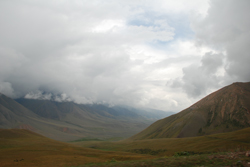
When Kyrgyzstan had been part of the Soviet Union, he had worked as a book keeper. After Independence, since there were no jobs in his profession, he had bought a car and started working as a taxi driver. In the USSR, there had been factories and enough livestock and agriculture that Kyrgyzstan had exported both wool and produce. Now there wasn't the surplus. People had just enough sheep and produced to feed themselves. He complained about the Chinese who were "sly" and came to Kyrgyzstan and bought up the stores and became rich. His sister, who he said spoke 10 languages fluently had been working at a Chinese store in Bishkek. The owner, who was a lot older than her, had married her because he was "sly" and only spoke Chinese and needed her to translate. I pointed out that maybe the Kyrgyz need to follow the example of the Chinese if they were the ones succeeding and the Kyrgyz weren't. I also mentioned how in the USA we believe immigrants make the country stronger... and, by the way, that I'm half Chinese.
He shifted to talking about the military. He had been in the Russian Navy in Vladivostok and had also been in Afghanistan. He said lots of Kyrgyz were sent to Afghanistan because they were mountain people. Many died there, "because the Russians are sly. In WWII, Stalin sent the Asians to war first before the Russians." He also mentioned he had served on the largest battleship, the Minsk. He said he had 4 friends who still served professionally in the army. He had considered it but the pay was too little. Also, the Kyrgyz army lacked food and uniforms.
About tourists, he said, Rowshan was the first Iranian he'd met and that there are lots of French and Germans. He said Israeli tourists were "sly" and didn't want to spend any money on hiring a taxi but would rather walk. I said, "Maybe they like hiking." He insisted they were just cheap.
We stopped at an impressive viewpoint where the green surface of the mountains seemed to split open revealing cracks of red earth. A bank of white clouds over some mountains marked where the lake was. We drove through a valley. By this time the road was just gravel. Our driver said in another country they'd put in a good road since there are so many tourists who want to go to the lake. We passed a small village of some run down buildings. It once had been a very prosperous communal farm with lots of livestock but now, since the end of the Soviet Union, it was poor. It is interesting to see how the collapse of the Soviet system really did effect so many places similarly. Our driver went on to talk about the current and previous presidents, both of whom he said were good but "sly". The first one collected money and sent it to Swiss bank accounts. The current he said was busy gathering a lot of money for himself as well.
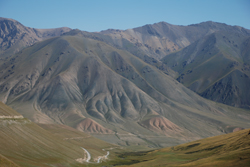
We began climbing a road up into the mountains and came upon a herd of yaks grazing. We stopped and another car stopped behind us. Inside were Sylvie and Florent. It turned out they were going to a different location to spend some time with a shepherd family. We wished each other a good trip and they took off up the road. The car was parked near an outcropping of rocks where marmots were perched.
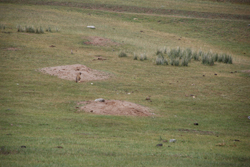
A stream rushed under through rocks. Little ferret looking animals ducked in and out of holes. Rowshan had gone walking towards the yaks saying he'd meet us up the road. There was quite a distance between the car and the yaks. I returned to tell the driver we should drive up the road and meet Rowshan. He said, "Yaks are dangerous." By this time Rowshan was already among the yaks and far out of hearing range. We drove up and I got a closer glimpse of the yaks. They looked like cows with long shaggy coats and long curved horns. There were some cows mixed in. I thought it must be someone's herd but our driver said they were completely wild and that's why their meat was so good.
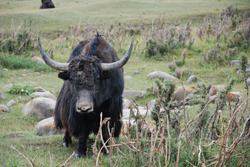
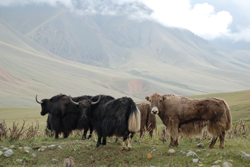
Eventually we came within view of the lake. It was cloudy but we speculated that it would clear up since the clouds seemed thin. We forged a river and drove following tire tracks through the grass. Soon we could see the yurts with their white felt domes clustered like mushrooms on the grass. There were several yurt camps at the lake including one, (thankfully) across the lake for young people where they had a disco at night.
We stopped at the last yurt in the group. The rain had stopped and there was a tiny patch of blue. There were mountains behind us and mountains across the lake. The whole area is surrounded by mountains but the area close to the lake is broad and flat pasture lands-- a mix of gold and green. This is the jailoo, summer pastures where shepherds bring their sheep, goats, horses and cows to graze.
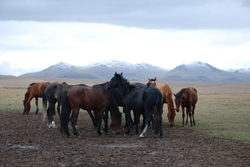
Most sets of yurts are guest houses run by local shepherds allowing them to gain enough of a secondary income to afford to preserve this traditional way of life.
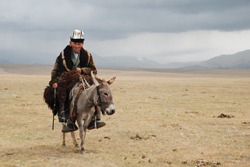
Kids ride donkeys to the lake to gather water.
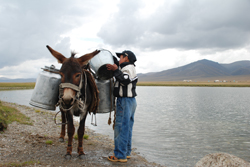
Tourists rent horses and ride across the pastures. The lake itself is an empty expanse of blue. There was just one boat pulled up on shore. Our driver had mentioned that in the winter, only fishermen go to the lake. He also mentioned that the pastures had once been used as an airport, the only remains of which were a couple ruins of buildings.
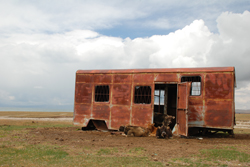
We took a walk next to the lake and then headed back to the yurt for lunch.
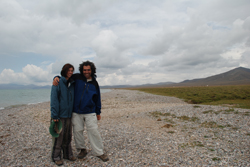
The yurt is a decent sized one though the felt on the roof is worn and has been reinforced with plastic. There are ornate felt rugs on the floor and colorful woven straps tied and woven into the red wooden supports. A reed mat insulates the lower part. There is a felt door cover but there is also a decorative wooden door- red with blue painted designs-- but is too lopsided to close.
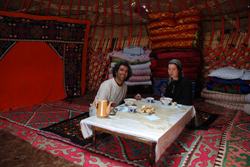
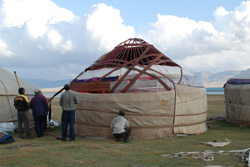
It started raining again so we have been hanging out in the yurt watching the activity outside: a donkey grazing, calves strolling by, dogs biting at a horse's heels, the clouds dissipating over the hills in the distance revealing a dusting of snow.
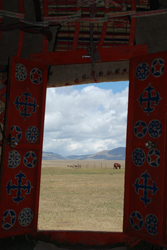
It was a cold evening but our hostess lit a fire in the yurt stove. It seemed to barely be working then suddenly, massive amounts of heat began pouring out of it. The yurt was soon toasty. After a dinner of plov, we hung out for a bit. I mostly stayed in the warm yurt but Rowshan went out looking for impressive changes of cloud cover and light.
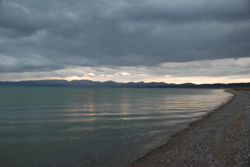
The sky seemed to be clearing but it was still very cold. But with the stove and warm blankets on futons, we were warm, comfortable, and went to sleep with a slight worry that we might die in the night from asphyxiation from the fumes of the burning coal. In the middle of the night, I heard footsteps outside the yurt but a munching sound which accompanied them sounded like the palomino horse we'd seen grazing earlier.
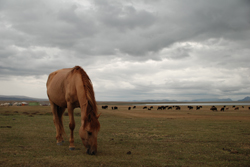
Day 2
In the morning, I noticed 2 spears of sunlight like laser beams pierce through the chimney hole and cast spots of golden light on the wall. There seemed to be a slight hint of blue visible through some of the larger holes in the felt roof.
We got up and were pleased to see a huge patch of blue and non-threatening puffs of white clouds drifting through the sky. Our hostess served fresh fried bread with jam--probably from some local wild berries since it was completely unfamiliar to me--and some buckwheat kasha.
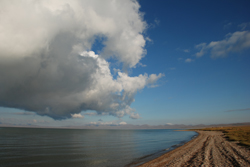
After breakfast we arranged to ride horses. Our host went and spoke to another man at a neighboring yurt and in an hour we saw someone leading 2 horses from the pastures towards the yurts. They saddled them up and brought them to us. One was bay colored and one was the perpetually eating palomino.
I was led to the bay and Rowshan took the palomino. At first riding was a bit awkward. Mine wanted to follow Rowshan's but if I let him get too close, he'd bite or kick Rowshan's horse. Also, Rowshan's horse seemed to have a flatulence problem which was unpleasantly evident if my horse got too close behind his. We named the horses Fighty and Farty. Incidentally, it seemed they came with 2 dogs who followed or ran ahead, playing and fighting. One found a scull of a sheep, the other a plastic bottle. At some point we did lose them. We walked along the lake a bit and then turned towards the mountains.
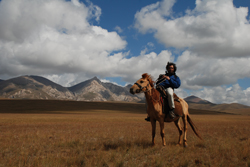
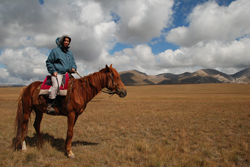
Rowshan whipped Farty into a trot and Fighty followed. I could barely get Fighty into a canter for a moment because if I used the whip, he would stop completely. However, Rowshan soon had Farty galloping across the pastures. We switched for a bit and Rowshan got Fighty galloping too.
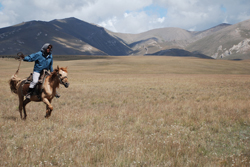
After a couple hours, we brought the horses back and went for a walk by the lake. The sun came out warming us a bit but the wind was still cold. The lake's shifting jewel colored waters were ruffled by waves. Across the lake we could see rain but our side was sunny, revealing views of the surrounding snow peaked mountains.
After lunch we started taking a hike to one of the mountains. The weather, at first, was cloudy with occasional patches of sun. After hiking for an hour, the sky became dark gray and sprinkles of rain started. We turned and headed back trying to outrun the cloud. What followed was several hours of schizophrenic weather: patches of bright sun, rain, wind, lightning, thunder, and hail--all seemingly randomly interspersed.
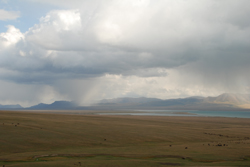
Finally, the weather cleared enough for a beautiful sunset with beams of sunlight shooting through the clouds which were rimmed with gold. However, our hostess, "Didn't have time" to light the stoves and after dinner she said it was too late so we had a very cold night.
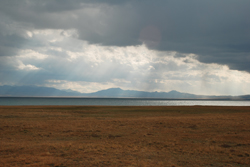
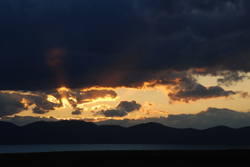
Day 3
Today the sky was a massive expanse of blue without a cloud in sight. After breakfast we hiked along a cow trail towards a different mountain from which we hoped we'd be able to see a range of further mountains that were gray, rocky and snow capped. The trail led into the hills and ran along a stream. We saw lots of cows and sheep, but also marmots and birds of prey swooping. One of the strange things about being in a place so far from city noises is that you can hear things you don't usually hear--animals crunching on grass, the rustle of raven's wings and even their croaking far off in the distance.
The area around the stream was rich green though the hills rose above with grasses turning brown from the dryness. Ahead the mountains each looked different: some grassy hills, others with sheets of gray gravel or rocky outcrops.
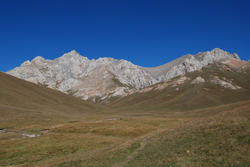
One was a pyramid of red. We headed towards this one. Occasionally we'd glimpse the snow capped peaks of the mountains behind it.
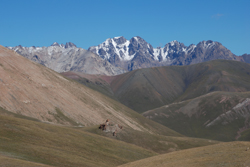
We ended up climbing a grassy hill next to the red hill. From there we had a stunning view of the lake to the south with its surrounding mountains. To the east were green river valleys with more mountains rising up behind them and to the west, from where we had come from, was grass, hills and the stream valley. We rushed back down to get back to the camp in time for lunch, seeing a huge eagle on the way.
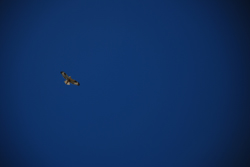
The distances are misleading here. It seems like it would be a quick walk from hills to the yurts but it still took us 45 minutes. It made me think that perhaps this could be a battlefield where armies run across and even though it looks like just a small field, it still takes them long enough for the hero to release himself from some dangerous situation, ride from where he is to the scene of the battle and save the day.
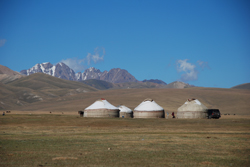
Though we've done some hiking and riding here, it seems a lot of our time is spent essentially doing nothing-- or rather, sitting in the door of our yurt and watching--seeing fat ass sheep and horses go by, watching the family in the yurts beyond us busily taking care of their sheep, horses, and cows, and staring at the piles of dirt dug up by surs (little mole things), hoping to get a glimpse of them shoving dirt out of their holes.
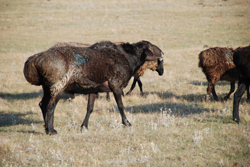
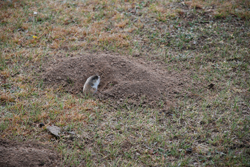
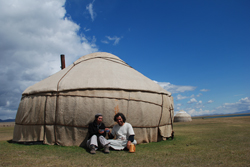
There is a beautiful stallion with a bell around his neck who the dogs fight with.
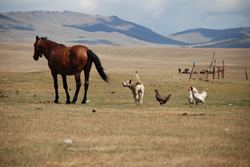
I think he is a little wild and tries to gather the domesticated horses into his herd. He races across the pastures, bell ringing and the dogs (and shepherds) try to chase him away from the other horses. We watch the sheep and goats parade by with the multitude of variations in bleating. Or sometimes we just watch the lake shifting colors: today it is a classic lake blue. It is strange how the stormy weather made it turquoise. We also watch the weather.
Rowshan said that these 3 days have been some of the best of our trip.
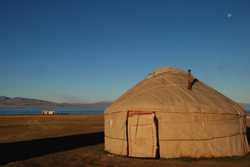
It is such a wild and beautiful place. This afternoon, we walked along the lagoon, separated from the lake by a narrow spit of land. Unlike the clear active waters of the lake, the waters in the lagoon are still and swampy so they attract lots of ducks and waterbirds. Since there was no blind or bushes to hide behind, we couldn't get very close before they flew off.
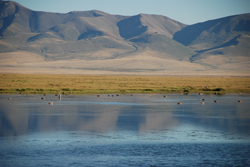
For our last evening, we were granted another beautiful sunset.
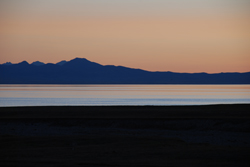
Comments
- Comments
Powered by My Blog 1.69. Copyright 2003-2006 FuzzyMonkey.net.
Created by the scripting wizards at FuzzyMonkey.net..
(Code modified by Rowshan Dowlatabadi)
Created by the scripting wizards at FuzzyMonkey.net..
(Code modified by Rowshan Dowlatabadi)

